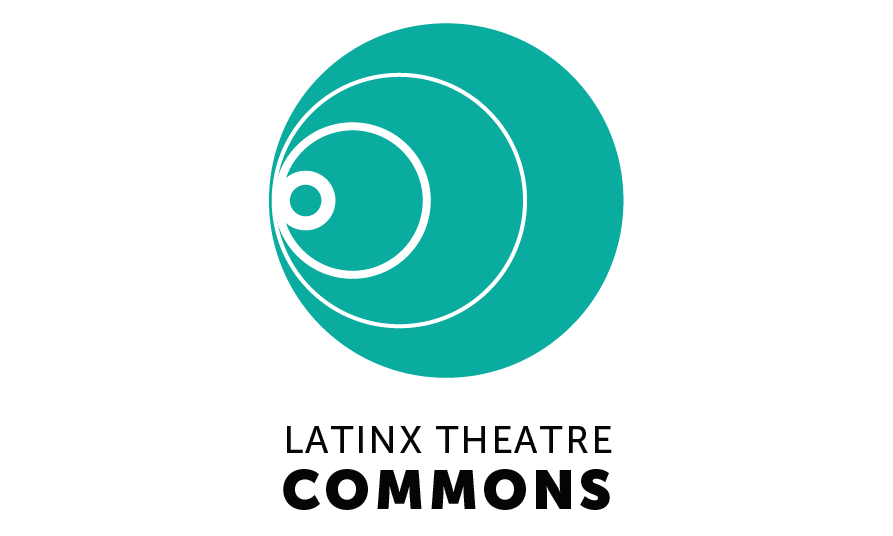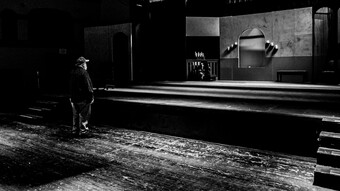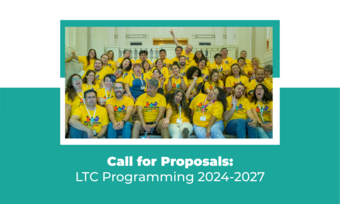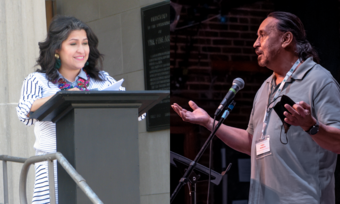Taking the Temperature
The Political Climate & Latina/o Theater
In preparation for the upcoming Latinx Theatre Commons National Convening, the Steering Committee asked the participants to weigh in on a few questions about the state of Latina/o theater. This is the first of three blogs detailing some of the participant responses.
How has the political climate (immigration issues, changing demographics, etc.) changed your ability to do your work? Has it created advantages or disadvantages?
"I think work gets made no matter what."
"Latina/os have always been challenged by the political climate in the US vis-a-vis our invisibility in the discourse about race. Just when we think things are getting better (Latinos helped put Obama in the White House), along come Arizona's SB 1070, Texas redistricting, and on and on. All of these apparent barriers give us something to fight against collectively and individually."
"As a woman, I feel that while Latina/os may be getting play on national regional stages, most of that play is still for plays written by Latino men. Women have yet to share equally in season representation."
"I haven't noticed changes. Under Bush I was produced, and under Obama I was produced. I have the same academic jobs as well. I keep waiting for 'Cuba' to fall out of fashion, but it hasn't yet."
"For the first time, we are being swayed by current events—not an artistic, or rather aesthetic need to program the most popular or ‘what I’ve always wanted to direct,’ or another musical, a black play, or Shakespeare, etc."
"If anything, it has made me more attractive to employers because I am tuned into a huge population."
"I think it’s a double-edged sword. Folks are more aware of the issues and the affected populations, but I think by and large the leaders of our professional community have tired of the conversations around race and gender. I see lip service being done to the ideals, but little in the programming reflecting the current situation in terms of demographics or political causes (immigration issues, etc.). When Latina/o work is thought of, it’s still a very limited palate that comes to mind in terms of guest artists and/or programming."
"I think of the political climate as conservative and backward, and as such, it creates an atmosphere of fear and a sense of all social issues moving into the past rather than the future. This retro-thinking makes unchallenging, non-risk-taking artists flourish—I think this is bad for Art. On the other hand, the more adventurous among us could use the stifling political climate as inspiration. The question is: will this adventurous, inspiring work ever be produced on a scale that affects change?"
"Political climate, like any climate, is perceived differently depending on (for instance) one’s proximity to the equator. As far as immigration issues as, say, a given ‘equator;’ I feel very distanced from it. That does not mean that I do not receive ripples from such climate where I stand. The ripples that reach me are those that perceive immigration issues and changing demographics as a numb knuckle product of a pinched nerve elsewhere. I fear and feel the true quake within humanity has deeper roots, and for some reason, my mind goes to those depths that lead me to things like climate. Real climate. The human manipulation of the natural and how it has divorced us from our true nature."
"Over all it has created disadvantages. All the Latina/os are now thrown into the same pile of illegals. This is a shift in paradigm. We were always in some way discriminated against. But now Americans are looking at us as someone who's stealing from them."
"But when it comes right down to it, it's not enough to have a moral stance about who should be heard and how. It's about commerce. And although the Latina/o buying power is expanding at a rapid rate, there is some debate around what they are actually spending it on. I'm having trouble funding a mainstream-ish Latina/o themed film for teens because the belief is that they are more likely to see a movie with white people than a cast that reflects their own."
It has lit a fire in me; I can clearly see my role as an artist now. It has brought more attention to Latina/os as a growing population—one that must be not only contended with, but understood. Theater is a good way, perhaps one of the best, to talk about ourselves to the Other.
"The protest through song, poetry, theater, dance, and music is shifting the political ground in Arizona and artists are giving body and voice to change. Disadvantages: I have seen less Latina/os entering the arts. The economic pressure in the state makes it so that many families will not encourage their children to enter the arts. The families being separated, and the human loss is abominable. I have thought of leaving my home state because I am ashamed of my community."
"I am a Chicano theater artist and I am no one’s victim. Because I also embrace and claim that I am an immigrant, a feminist, an American, a citizen, a community activist, a professor, a professional director, and much more; I no longer accept being vilified or marginalized or relegated to the outer reaches. I can no longer accept the current narrative of Latina/os in the mainstream media, in the regional theater, and in the minds of the dominant culture. I will no longer accept the narrative that Latina/os theater artists with advanced degrees and experience in the profession continue to be steered towards dead-end apprenticeships and un-paid internships, while members of the dominant culture are offered positions and directing opportunities as soon they graduate. As Latina/o Americans, not only are we the inheritors and benefactors of the United States experience, but also the carriers and guardians of our indigenous and native past. Our life experience runs through our veins ethnically, socially, politically, sexually, and aesthetically—and the unique complexity of our whole community is poised to handle the dynamic changes of the 21st Century storytelling."
"It has lit a fire in me; I can clearly see my role as an artist now. It has brought more attention to Latina/os as a growing population—one that must be not only contended with, but understood. Theater is a good way, perhaps one of the best, to talk about ourselves to the Other."
"I have always believed that disadvantages are your advantages so I attempt to walk right into those disadvantages and see where they lead me."
"I think as government continues to attack personal freedom and limit privacy, as the environment seems to degrade and the economy staggers, it is not so much the ability of the work that is affected, but rather the necessity to continue the work that grows sharper."












Comments
The article is just the start of the conversation—we want to know what you think about this subject, too! HowlRound is a space for knowledge-sharing, and we welcome spirited, thoughtful, and on-topic dialogue. Find our full comments policy here